
Most UK ports have prepared for the worst-case scenarios and will not be congested as a result of potential disruptions to trade following the official exit of the UK from the European Union, the British Ports Association has said.
The group said disruption at certain ports may mean increased costs for traders, manufacturers and ultimately potentially consumers. As a result, BPA called on the government to roll out a clear and detailed vision for the UK’s trade and industrial policy.
According to the UK’s Prime Minister Boris Johnson, the UK wants a comprehensive free trade agreement with the EU similar to the one Canada has. However, unlike Canada, the Prime Minister seemed to suggest that the UK is not seeking “alignment of any kind”.
“The clock is ticking and the freight sector needs to understand exactly what border requirements there will be from January 2021.
“We have an excellent relationship with the various parts of government that are planning for Brexit but now we need a clear and detailed statement on their positive vision for UK trade and industrial strategy – with Europe and the world – and how that will affect industries that rely on free-flowing trade through UK ports.
“The goalposts have been moved several times over the last three and a half years and this uncertainty must now end. It is now almost inevitable that the promise of continued “frictionless trade” will not be met.
“UK ports have been preparing for disruption for three and a half years and are as ready as they can be. However, we remain concerned at the readiness of the wider freight industry and the capacity of the multitude of government agencies that operate at the border.
“Ports and traders need to know what the government is aiming for when it comes to equivalence, regulatory alignment and agreeing a level playing field – which are not the same thing.
“UK port gateways handle 95% of our international trade, and about half of this is with the EU, much of which is via roll-on roll-off ports,” the Chief Executive of British Ports Association, Richard Ballantyne, said.
The UK officially left the EU on January 31, 2020, kicking off the transition period during which the two sides need to negotiate the terms of their future relationship, in particular, trade.
The transition period is set to end on December 31, 2020.